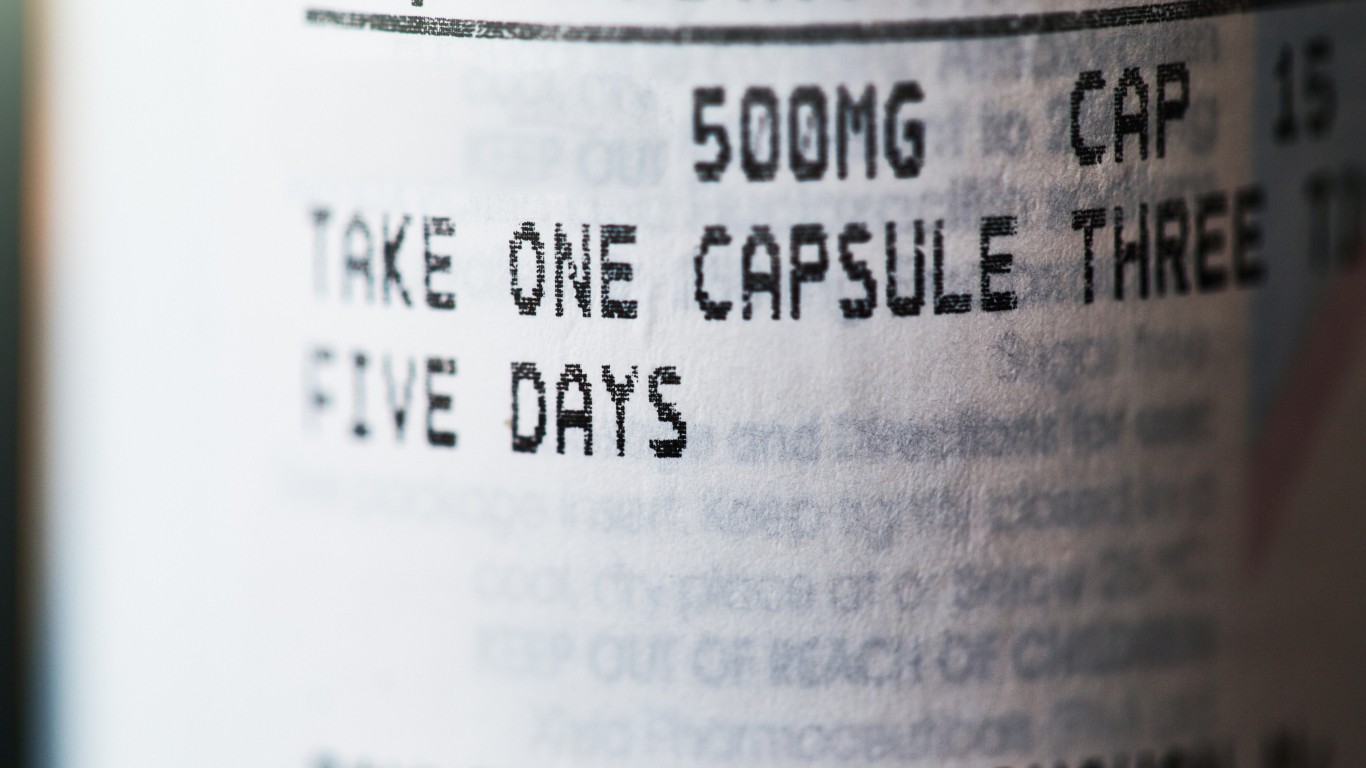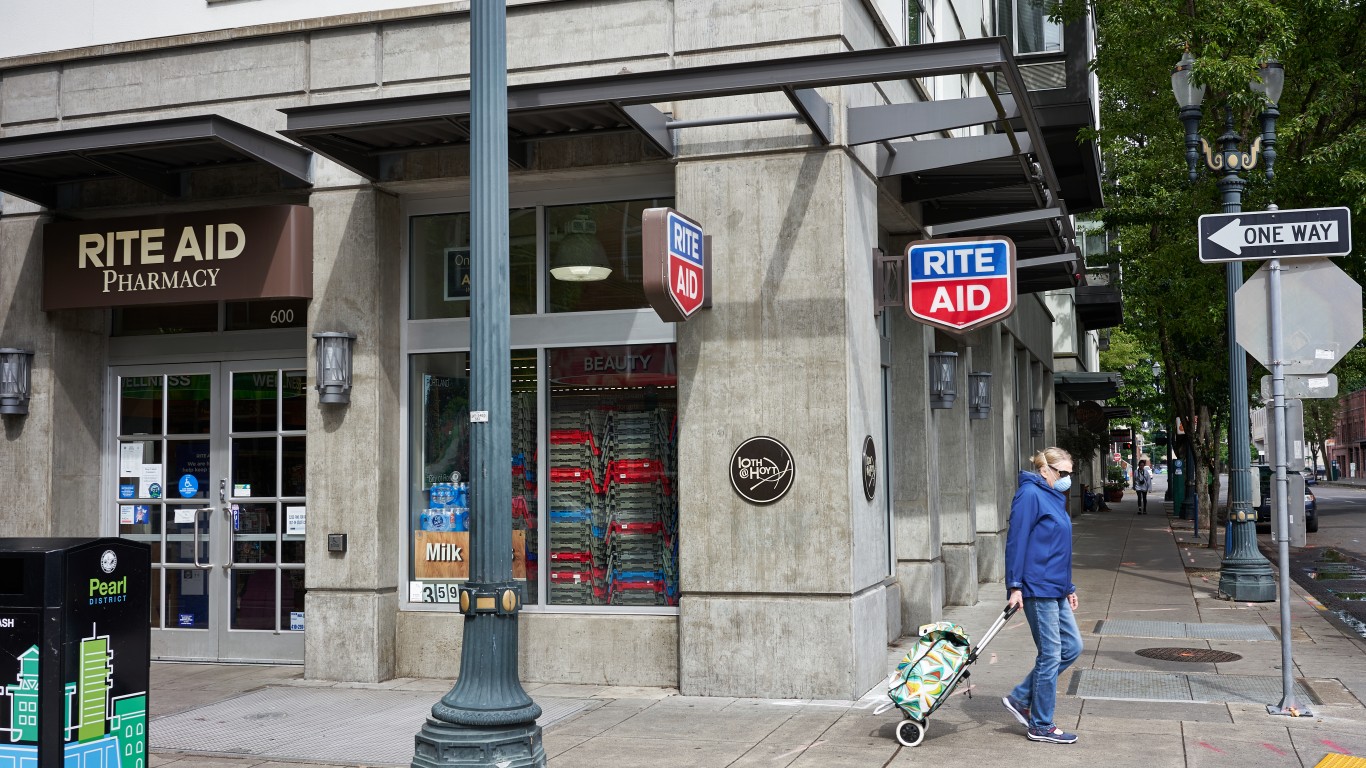
The percentage of Americans without health insurance has steadily declined since the passage of the Affordable Care Act in 2010. The act provides coverage for prescription drugs, with limitations – but even for those with prescription coverage, through the ACA or other insurance, getting the drugs they need can often be problematic. (These are the 21 states where the most people don’t have health insurance.)
To identify the biggest problems people have with their prescription medicines in America, 24/7 Tempo reviewed “Barriers to Health Care Access in the Patient Experience,” a report released in October 2021 by the Pharmaceutical Research and Manufacturers of America, a pharmaceutical industry trade group. The report is based on PhRMA’s Patient Experience Survey, which was given to 3,624 patients who take prescription medicines between Nov. 30 and Dec. 18, 2021.
Nearly half of all Americans face challenges in getting their prescriptions, chiefly due to insurer-imposed restrictions. One barrier reported by patients is utilization management, which requires prior authorization from a healthcare professional before a dosage is prescribed. Another is step therapy, a process by which a patient must “fail” on the insurer-preferred drug before one recommended by the doctor is given. Minority groups face the hardest time in getting the medications they need.
The delays and bureaucratic wrangling caused by waiting for approval may lead patients to fall off their medication regimen, which may result in negative health outcomes. In the PhRMA report, 82% of respondents reported not taking their medication multiple times due to utilization management hurdles. That’s reflected in the fact a third of the survey respondents said they skipped one or more dosages. And 48% of all those reporting one or more episodes of non-adherence say their health suffered as a result. (These are the most common reasons people avoid seeing a doctor.)
Click here to see the 10 biggest problems people have with their prescription meds.

Picked up the medicine, but did not take any
> Patients who take any prescription medicines for any illness who reported this problem: 14%
Major reasons patients in the U.S. do not take their medications include fear of side effects, confusion as to directions, and simple forgetfulness.
[in-text-ad]

Had to appeal a decision made by my insurer regarding a prescription medicine
> Patients who take any prescription medicines for any illness who reported this problem: 17%
Patients have the right to appeal an insurer decision on their medication. Yet some may forgo the lengthy appeal process altogether and not take the medication. A 2020 report prepared by NPR, the Harvard School of Public Health, and the Robert Wood Johnson Foundation revealed that 48% of middle-income ($35,000 to $99,000) respondents said they were denied coverage for a drug and didn’t fill the prescription, and 51% of those in the lower income bracket (less than $35,000) reported the same.

Had to try and fail on another medicine before getting the medicine my doctor originally prescribed
> Patients who take any prescription medicines for any illness who reported this problem: 18%
Generic drugs are often prescribed originally in place of brand-name medications due their cheaper cost. The FDA analyzes generic drugs to ensure their safety, quality, and effectiveness. One meta-analysis reviewed the patient outcomes of a generic versus brand-name cardiovascular drug. In 60% of the studies reviewed, no difference between the two types of drug was exhibited, while 26% showed the brand-name was more effective.

Insurance company did not count amounts covered by a pharmaceutical company’s copay assistance toward the deductible and annual maximum out-of-pocket costs
> Patients who take any prescription medicines for any illness who reported this problem: 18%
Some pharmaceutical companies will cover part or all of a patient’s copay for certain medications, but insurance companies might not consider those amounts in reducing the patient’s deductible and other costs, discouraging individuals from taking advantage of the programs and thus getting the drugs they need.
[in-text-ad-2]

Didn’t finish all of the medicine
> Patients who take any prescription medicines for any illness who reported this problem: 20%
The American Medical Association says the top reason patients don’t take their medicines is fear about potential side effects. Cost and not understanding why the drug is needed round out the top three. Other reasons are a lack of symptoms and the feeling that the medication isn’t doing any good.

Have to cut pills in half
> Patients who take any prescription medicines for any illness who reported this problem: 20%
A survey of primary care patients in Germany revealed nearly 24% split their pills. Patients may do this to lower their overall monthly costs or to lessen what they feel is an excessive dose. Doctors and pharmacists advise against cutting pills in half. However, according to the Cleveland Clinic, it can be done with a pill that has a line or score down the middle, providing the doctor or pharmacist allows it. Extended-release medication or oddly shaped pills should not be cut in half.
[in-text-ad]

Delayed picking up or taking the medicine
> Patients who take any prescription medicines for any illness who reported this problem: 28%
A study in the Journal of the American Pharmacist Association estimated 90% of Americans live within five miles of a community pharmacy. Yet the association noted that access to pharmacies varies widely across the country, so in some areas, it may take time for the patient to get to the pharmacy or send someone to pick up the prescription. Once the prescription is in hand, patients might put off taking it due to fear, confusion, or other factors.

Did not fill or pick up the medicine from the pharmacy
> Patients who take any prescription medicines for any illness who reported this problem: 22%
Some people don’t fill their prescriptions because they can’t afford to, or because they don’t want to take the medication for a variety of reasons. Even if they do fill it, though, lack of transportation may be a major barrier to obtaining it. The problem was more acute in minority populations.

Insurer required doctor to prescribe a different medicine than the one doctor believed would be most effective
> Patients who take any prescription medicines for any illness who reported this problem: 24%
Prior authorization is required for medications under many insurance plans. Through the process known as “step therapy,” a patient must take the preferred drug for a medical condition and experience no benefit from it before another medication is prescribed.
[in-text-ad-2]

A medicine my doctor recommended or prescribed was not covered by my insurer (excluded from the “formulary”)
> Patients who take any prescription medicines for any illness who reported this problem: 29%
A 2020 report prepared by NPR, the Harvard School of Public Health, and the Robert Wood Johnson Foundation surveyed people across all income classes. More than three in 10 in all groups reported they or a household member were told their insurer would not cover a prescription written by their doctor.

Had to wait for my insurer to provide prior authorization for a medicine my doctor prescribed
> Patients who take any prescription medicines for any illness who reported this problem: 31%
Waiting for a prescription can cause adverse events. One-third (34%) of physicians responding to a recent AMA survey reported the prior authorization process led to hospitalization, disability, or even death, for a patient in their care. In addition, 82% reported that some patients abandon treatment due to authorization delays and struggles with health insurers.
[in-text-ad]

Skipped one or more doses
> Patients who take any prescription medicines for any illness who reported this problem: 32%
Prescription medications can successfully treat many chronic conditions. Unfortunately, for all the good they do, they also come with side effects that could lead some patients to skip doses, which lessens the effectiveness of the drug. Common side effects include: constipation, skin rash, diarrhea, dizziness, dry mouth, insomnia, nausea, drowsiness, and headaches. Patients might also skip doses out of forgetfulness.
It’s Your Money, Your Future—Own It (sponsor)
Retirement can be daunting, but it doesn’t need to be.
Imagine having an expert in your corner to help you with your financial goals. Someone to help you determine if you’re ahead, behind, or right on track. With SmartAsset, that’s not just a dream—it’s reality. This free tool connects you with pre-screened financial advisors who work in your best interests. It’s quick, it’s easy, so take the leap today and start planning smarter!
Don’t waste another minute; get started right here and help your retirement dreams become a retirement reality.
Thank you for reading! Have some feedback for us?
Contact the 24/7 Wall St. editorial team.
 24/7 Wall St.
24/7 Wall St.
